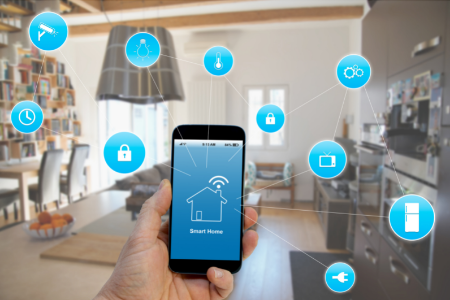
Every year there seems to be a new phone, gadget or product that is a must-have on everyone’s shopping list. But when it comes to shopping for a home, how does the newest home technology influence the buying and selling process? Do homeowners need to add smart home features to sell their homes? Should buyers be on the lookout for automation in their new home? If, like most people, you have questions about home automation and the real estate market, we have a few answers that may help you out.
Smart Home Standards Vary
If you are confused about whether smart home technologies are expected in homes in your area, your best bet is to connect with a real estate agent. These professionals have more extensive knowledge regarding current home automation trends in their market and can help you decide whether it makes sense to add features to a home you are selling or look for them in a home you are buying. One key point to note is that a property’s age may influence how updated technology is inside of the home. Newer homes are more likely to include automation, or at least the ability to easily be connected to trending devices. For older homes, automation may not be present, but it never hurts to add the necessary wiring to attract potential buyers.
Keep in mind that these small upgrades could help you sell your home faster, but Inc. notes not all buyers are into smart homes. Some people dislike the idea of connecting everything in their home. Older buyers may be put off by complicated technology, while others may love the added convenience. Either way, simple upgrades like adding outlets shouldn’t negatively impact the buying or selling process.
Some Automations Are More Popular Than Others
When you think of home technology, do you think of sound systems and entertainment features? While these perks can make a home more attractive to buyers, or could attract you to a new home, most people are simply not looking for these kinds of features when they are really looking to buy a home. The technology that seems to appeal to most people are options that increase security, keep homes comfortable, and help lower energy costs.
There are a variety of home security options available that will allow you to monitor your home from afar. For example, video doorbells (doorbells with cameras built-in) allow you to livestream footage from your front door no matter where you are. You can also invest in classic outdoor and indoor cameras that stream video to your phone. Solar motion-sensing lights will light up your walkway and the perimeter of your home when movement is sensed. These use clean energy and deter potential burglars.
…But That Doesn’t Mean They Will Add Value
The kind of security offered by Nest has been a hit with homeowners, but Intelligencer explains that doesn’t mean it will increase your property value or make your home more attractive to buyers. The real estate market can be finicky, so it may take time to see any return on investment. You may need to make more improvements in the future, or you may need to focus on other areas inside your home. Your best option may be to install automation that adds to your own experience in the home for the time-being, instead of being overly concerned with how that technology will affect your home’s value. After all, many of the most popular gadgets are mobile so you can always take them with you.
Home automation doesn’t have to be confusing if you are thinking of buying a new home or selling your old one. Just be sure to reach out to a licensed real estate agent who is familiar with these upgrades and take the guesswork out of all the new gadgets, technology, and devices that can affect the sale or purchase of a home.
